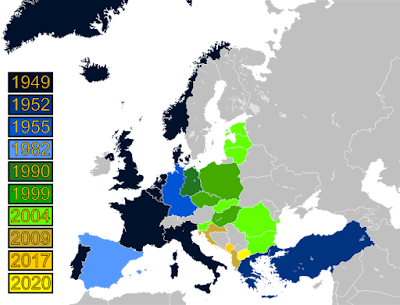Friday, December 24, 2021
In a post yesterday, I discussed water-related issues between Russia and Ukraine. I did this as a means of exploring what, if any, concrete benefits an invasion of Ukraine might bring to Russia. The point I was making was that, rather than just looking to "nationalism," "Russian pride," or any other vague explanation for why something like this might happen, it makes more sense to look at tangible issues.
 |
| Sevastopol, Ukraine, in the Summer of 2006 |
But what about the rest of Ukraine? What benefit to Russia would an invasion bring? Or is Vladimir Putin simply rattling Ukraine's cage as a means of extracting concessions from the US and NATO?
As I discussed in another post on Ukraine this week, there are some concrete benefits that expanded Russian control over Ukrainian territory could bring to Moscow, namely enhanced control over the flow of water into the Crimea. This has become a real bone of contention between Moscow and Kyiv, particularly over the past year. |
| The North Crimean Canal is looking pretty dry these days |
While water is of doubtless importance to authorities in the Crimea, this doesn't really strike me as something that the Kremlin would be willing to go to war over. In his recent bellicose statements relating to Ukraine, Putin hasn't mentioned the water issue. Rather, Russian complaints about Ukraine shutting off water to the Crimea seem like part of a larger strategy of crying foul at Kyiv in order to justify Moscow's harassment of Ukraine.
Russia's approach to Ukraine, particularly its eastern regions, has evolved since 2014. Back in the days immediately following Moscow's annexation of the Crimea, it seemed to me that Russia's meddling in eastern Ukraine derived mainly from a desire to change the subject. For every minute that the world was talking about eastern Ukraine (and whether or not Russia would invade), this was one less minute that they were discussing the fact that Russia had just illegally absorbed the Crimea. So, the plan seemed to be: create a distraction in a region (eastern Ukraine) where Russia had influence but no real interests in order to help consolidate its hold over another region (the Crimea) where it actually had tangible interests and that it really wanted to keep.
Since then, Moscow's support for ethnic Russian separatists in eastern Ukraine has struck me as having been principally a tool to keep Kyiv off balance. The threat of invasion, in my opinion, has been far more useful to Moscow than an actual invasion would be.
And I believe that this is the case with Russia's saber-rattling in recent weeks as well. Putin, I think, has been using the threat of invading Ukraine as a means of creating divisions between the United States and its NATO allies. His ultimate goal is, as much as possible, roll back American influence in eastern Europe. This means ensuring that countries like Georgia and Ukraine stay out of NATO, and that current cooperation between those countries and NATO be scaled back or cease outright. The US has, in recent years, been more supportive of establishing concrete timetables for Ukraine and Georgia joining NATO, whereas European allies have only supported vaguer promises that the two countries will be offered membership at some point in the future.
So, my thinking for the past seven years has mostly been that Russia was using the threat of invading Ukraine mainly as a means of pursuing other policy goals--consolidating and normalizing its control over the Crimea, and resisting American efforts to expand its influence in eastern Europe, and the former USSR in particular.
That being said, this dance has been going on for seven years now. After a while, stuff like this begins to take on a logic of its own. After years and years of making threats, I'm sure there are at least some people in the Kremlin who have begun to think that Russia will look weak if they don't follow through on their threats. There are doubtless at least some individuals in powerful positions who would stand to benefit financially or in other ways if an invasion were to take place. So even if invading Ukraine is not something that, on balance, would make a lot of sense for Russia to do, that doesn't mean it won't happen. Just look at the United States and Iraq between September of 2001 and March of 2003 for an example of how something like that can take place.
And what would happen if Russia were to invade Ukraine? Well, that's an issue that I'll explore in a future post.
***
Also see:
Crimea River: Water and Russian-Ukrainian Relations
The Not-So-Great Game: The US and Russia in Post-Soviet Space
Bad Idea Jeans: Ukraine Edition
Crimea and eastern Ukraine: Things Can Always Get Worse
***
More commentary, photos, and links can be found in the Borderlands Lounge.


No comments:
Post a Comment